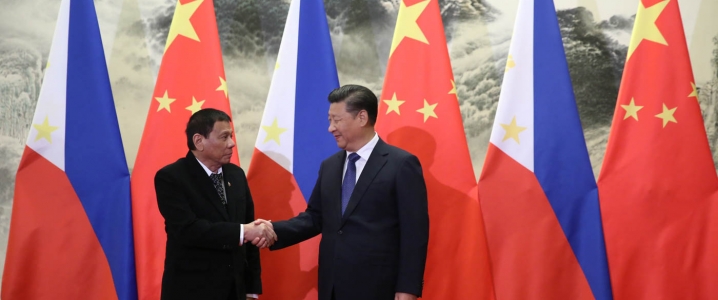China and the Philippines have just announced an official agreement to go forward with a groundbreaking joint oil and gas exploration deal - reportedly the biggest oil and gas development in all of Asia. This memorandum of understanding (MOU) was just one of a whopping 29 agreements signed this week during Chinese President Xi Jinping’s visit to the Philippines, many of which focused on strengthening trade and working together on massive infrastructure strategies being pushed forward by Beijing. Xi, who is the first Chinese leader to set foot in Manila in over a decade, described the state visit as a “milestone” in the relationship between China and the Philippines.
The recent visit and ensuing deals are just one part of a larger effort on the part of Beijing to strengthen their economic and diplomatic ties with the Philippines. The friendliness between these Asian nations is particularly notable in light of their long-standing dispute over the resource-rich South China Sea, but even that delicately contentious topic was broached during Xi’s visit to Manila. After the talks Xi said that China will be working to address the disagreements over the South China Sea over the next three years by finalizing a code of conduct for the disputed body of water in cooperation with other Southeast Asian countries.
There are still relatively few details known to the public about the terms of this week’s hush-hush oil and gas deal. The exact location remains undisclosed, but Philippines Energy Secretary Alfonso Cusi disclosed to reporters after the meeting that the deal covers the "West Philippine Sea/South China Sea." According to a framework draft (it’s still unclear how similar the Philippine officials’ framework agreement is to the final agreement) made public by Senator Antonio Trillanes, an opposing senator in the Philippines, the exploration would be mutually beneficial for the two nations, and their opposing views on the South China Sea, and more broadly on sovereignty and maritime rights, would not be challenged on either side of the deal. This simply means that neither country will change their claim to the West Philippine Sea nor recognize each other’s territorial claims over long-disputed waters like Panatag (Scarborough) Shoal or the Spratlys Islands by signing the MOU. The type of deal made, a memorandum of understanding (MOU), is typified by a lower level of commitment as compared to the more binding memorandum of agreement (MOA). Related: Goldman Expects Extreme Volatility In Oil Markets This Month
Despite being touted as “mutually beneficial” the memorandum is not universally supported, with many people in the Philippines feeling that giving any economic concessions to China undermines the nation’s territorial claims in the South China Sea. In the process of meeting with Xi and signing the oil and gas agreement, Philippines President Rodrigo Duterte set aside a landmark 2016 international tribunal ruling that declared Beijing’s blanket claim of the South China Sea as baseless. Hundreds of protesters in Manila expressed concern with what is seen as Duterte’s weakness and lack of transparency on the territorial dispute in his effort to court Chinese investment in demonstrations outside of the Chinese embassy in Manila this week, chanting “Philippines is not for sale.”
A 2005 joint exploration deal between China, the Philippines, and Vietnam is currently still tied up in the Supreme Court after lawmakers challenged its constitutionality. The Joint Marine Seismic Undertaking, approved by the Arroyo administration in the Philippines, was an agreement for oil companies from the three nations - the Philippine National Oil Company (PNOC), the China National Offshore Oil Co (CNOC), and the Vietnam Oil and Gas Corp (PetroVietnam) - to jointly conduct research of offshore oil reserves in both disputed and undisputed areas of the South China Sea. The deal hasn’t been able to move past litigation thanks to a section of the 1987 Constitution which mandates all companies involved in joint development of natural resources to have at least 60 percent ownership by Filipino citizens.
It remains to be seen how the new Chinese deal will sidestep these murky legal and literal waters, but it’s clear that Duterte and Xi are both eager to begin extracting offshore oil - so much so that their deal would become the biggest development in the Asian continent.
By Haley Zaremba for Oilprice.com
More Top Reads From Oilprice.com:
- Another Nuclear Megaproject Bites The Dust
- The Implications Of Soaring Diesel Prices
- Oil Prices Inch Lower On Crude Inventory Build


















